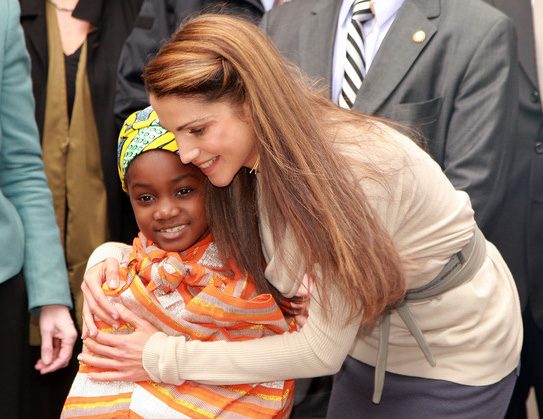



A “mum and a wife with a really cool day job” is the way Queen Rania al Abdullah of Jordan sums herself up on Twitter. That breezy description, with its blend of tradition and technology, nicely encapsulates the way she has redefined her royal role, challenging stereotypes and changing the Arab world.
Even before she became queen in 1999, a large part of Rania’s day job involved working for the public good with a particular focus on the protection and development of children, especially girls. (It is unclear how much the royal family donates directly to the causes she champions, all of which raise funds on their own.) The Jordan River Foundation, a nonprofit she founded in 1995 and continues to chair, helps women secure employment and sell their handicrafts, but also seeks to protect children from domestic abuse; its Child Safety Center is said to be the first of its kind in the Arab world. In a similar vein, she has fought to end so-called “honor killings,” murders committed by men to punish sisters or daughters who have “disgraced” their families, often by running away with and marrying the wrong man.
The honorary chair of the United Nations Girls’ Education Initiative, she is especially passionate about education and has led efforts in Jordan to improve classroom quality, teaching standards, computer access, and family involvement. In 2008, she started the Madrasati (“My School”) Foundation, which aims to rebuild and repair some 500 underfunded local schools throughout Jordan, most notably for Palestinian youngsters in East Jerusalem. The Queen’s website champions an education-equals-opportunity formula and her stance that schooling is an inalienable right is explicit: “I believe you deserve an education. Whoever you are. It’s your right.”
Born in Kuwait to Palestinian parents, Rania Yasin, 44, had a middle-class upbringing and a Western education, including a business degree from the American University in Cairo. In 1991 she moved to Amman, where her parents had settled after fleeing Kuwait with hundreds of thousands of other Palestinians following the 1991 Gulf War. She was working in marketing for Apple Computers when she met Prince Abdullah two years later. At the time, it was expected that King Hussein’s brother would succeed him, but on his deathbed the king promoted his eldest son.
More recently, Rania has been at the forefront of a call for support for more than half a million Syrian refugees currently living in Jordan, one of six of which lives in abject poverty according to a recent UN report. "While Jordan is small in size, it is big in its national and humanitarian sense of responsibility," she said in her keynote speech at a recent summit about support for child refugees. "The world has come to know very well it can rely on Jordan in difficult humanitarian crises. And the world has a major role in supporting all countries hosting refugees, because that is a guarantee of our region’s stability.” She has also addressed world leaders with a more generally international but still urgent campaign to eradicate poverty, tackle inequality, and prevent further climate change.
With her supermodel looks, English accent, and progressive agenda, Rania gets adoring notices in the Western world; she has been interviewed on Oprah, and her children’s book, The Sandwich Swap, which conveys a message of cultural tolerance through a tale about schoolgirls sharing lunchtime snacks of peanut butter and hummus, was a New York Times best seller. In Jordan, however, where her husband King Abdullah II is not popular, she has been criticized for indulging in a lifestyle that is too extravagant and Westernized. In 2011, in a rare display of criticism of the royal family, 36 tribal leaders accused her of promoting herself to the extent that she was “a danger to the nation and the structure of the state and the political structure and the institution of the throne.” According to various press accounts, Rania began to dress more conservatively and lower her public profile. Still, she remains committed to her “day job.” “I am an Arab through and through,” she insists. “But I am also one who speaks the international language.”